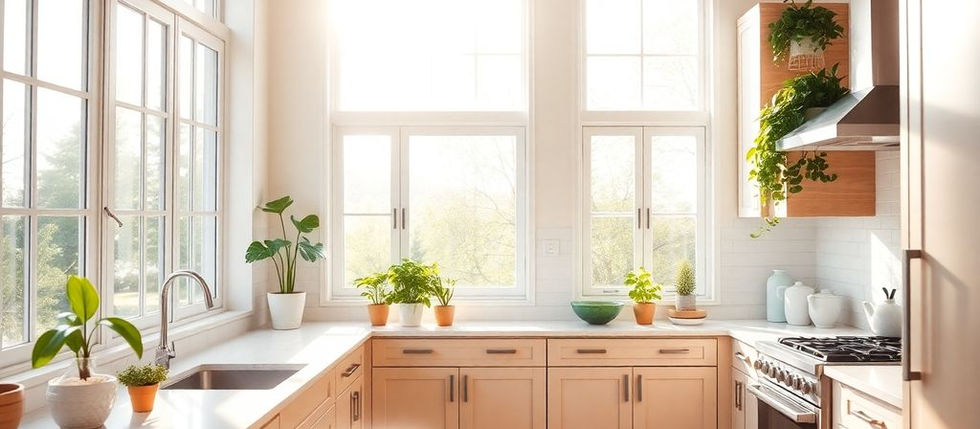Revamping your kitchen is an exciting journey that blends efficiency with style. In Hartford, kitchen remodels are all about creating a space that is both beautiful and functional. Whether you're looking to maximize space, incorporate modern design trends, or add smart technology, a kitchen remodel can significantly enhance your home's value and your quality of life. This guide will walk you through everything you need to know about planning and executing a successful kitchen remodel in Hartford.
Key Takeaways
Assess your needs and set clear goals before starting your kitchen remodel.
Budgeting is crucial; plan your finances carefully to avoid overspending.
Hiring a professional remodeler can save time and ensure high-quality results.
Incorporate smart technology to make your kitchen more efficient and modern.
Choose sustainable materials and energy-efficient appliances to make your kitchen eco-friendly.
Planning Your Hartford Kitchen Remodel
Assessing Your Needs and Goals
Before diving into your kitchen remodel, it's crucial to understand what you need and want from the new space. Think about how you use your kitchen daily and what improvements could make it more functional. Consider your lifestyle needs and how the remodel will impact your home's overall value. This initial step helps in creating a clear vision for your project.
Budgeting for Your Remodel
Setting a budget is a vital part of the planning process. Determine how much you're willing to spend and allocate funds for different aspects of the remodel, such as materials, labor, and unexpected costs. A well-planned budget ensures that you can achieve your dream kitchen without financial stress.
Choosing a Professional Remodeler
Hiring a professional remodeler can make the process smoother and more efficient. Look for experts who have experience in kitchen remodeling and can bring your vision to life. They will guide you through the entire process, from selecting materials to finalizing the layout. By working with a professional, you gain access to a team dedicated to creating a space that is both beautiful and functional.
Designing a Functional and Stylish Kitchen
Maximizing Space Efficiency
Unlock the secrets to a functional kitchen by making the most of your space. Consider installing custom-made cabinetry that reaches the ceiling to optimize vertical storage. Utilize pull-out shelves, drawer organizers, and built-in dividers to maximize space. Additionally, choosing light-colored paint or finishes and incorporating strategic lighting can create an illusion of a larger and more open space.
Selecting the Right Materials
Choosing the right materials is crucial for both style and durability. For countertops, popular options include granite, quartz, and marble. Each offers a unique blend of aesthetics and resilience. When it comes to cabinetry, both face-frame and frameless constructions can significantly impact the look and storage capacity of your kitchen. Quality materials and durable hardware are essential for a long-lasting kitchen.
Incorporating Modern Design Trends
Stay ahead of the curve by incorporating modern design trends into your kitchen. Think about adding a mix of task, ambient, and accent lighting to create a well-lit and inviting space. Smart appliances and energy-efficient models not only enhance functionality but also add a contemporary touch. Consider using recycled and sustainable materials to make your kitchen eco-friendly while keeping it stylish.
The Remodeling Process: Step-by-Step
Initial Consultation and Design
The first step in your kitchen remodel is the initial consultation. During this phase, you'll meet with your chosen remodeler to discuss your vision, needs, and budget. This is where your ideas start to take shape, and a detailed plan is created. The design phase is crucial as it sets the foundation for the entire project.
Demolition and Construction
Once the design is finalized, the next step is demolition. This involves removing old cabinets, countertops, appliances, and flooring. If your remodel includes structural changes, such as moving walls, these will be addressed during this phase. Following demolition, the construction phase begins, which includes updating plumbing and electrical systems, installing new drywall, and painting.
Final Touches and Installation
The last phase of the remodeling process is all about the final touches. This includes installing new cabinets, countertops, and flooring. Appliances are then put in place, and any remaining fixtures, such as lighting and hardware, are added. This phase brings your vision to life, transforming your kitchen into a functional and stylish space.
Custom Cabinetry and Countertops
Benefits of Custom Cabinets
Custom cabinets are a fantastic way to add a personal touch to your kitchen. They are built to fit your space perfectly, ensuring no wasted areas. Custom cabinets can be designed to match your style, whether you prefer a modern, sleek look or a more traditional design. Additionally, they offer superior quality and durability compared to standard options.
Choosing the Perfect Countertop
Selecting the right countertop is crucial for both functionality and aesthetics. Granite, quartz, marble, and ceramic are popular choices, each with its own benefits. For instance, granite is known for its durability and unique patterns, while quartz offers a wide range of colors and is easy to maintain. Marble provides a luxurious look but requires more upkeep. Ceramic is heat-resistant and comes in various styles.
Installation and Maintenance Tips
Proper installation is key to ensuring the longevity of your cabinets and countertops. It's best to hire professionals for this task. Once installed, regular maintenance will keep them looking new. For cabinets, this means cleaning with a mild detergent and avoiding harsh chemicals. Countertops should be wiped down daily and sealed periodically if they are made of porous materials like granite or marble.
Enhancing Your Kitchen with Smart Technology
Smart Appliances for Modern Kitchens
Incorporating smart appliances into your kitchen can significantly enhance efficiency. Smart refrigerators, ovens, and dishwashers can be controlled remotely, allowing you to manage your kitchen even when you're not at home. These appliances often come with features like energy-saving modes and diagnostic tools that alert you to potential issues before they become major problems.
Integrating Smart Lighting Solutions
Smart lighting solutions can transform the ambiance of your kitchen. With the ability to adjust brightness and color through a smartphone app or voice command, you can create the perfect lighting for any occasion. Additionally, smart lighting can be programmed to turn on or off at specific times, helping you save energy and reduce utility costs.
Home Automation and Connectivity
Home automation systems can connect all your smart devices, creating a seamless and integrated kitchen experience. From controlling your appliances and lighting to managing security cameras and thermostats, home automation offers unparalleled convenience. Imagine starting your coffee maker from your bed or receiving notifications when your oven has preheated—these are just a few of the benefits of a connected kitchen.
Sustainable and Eco-Friendly Remodeling Options
Using Recycled and Sustainable Materials
One of the most critical aspects of sustainable kitchen design is the selection of materials. Consider options like recycled glass, bamboo, concrete, and reclaimed wood. These materials not only reduce waste but also add a unique touch to your kitchen. Choosing sustainable materials can significantly lower your environmental impact.
Energy-Efficient Appliances
Upgrading to energy-efficient appliances is a smart move for any eco-friendly remodel. Look for appliances with the Energy Star label, which ensures they meet strict energy efficiency guidelines. These appliances use less electricity and water, helping you save on utility bills while reducing your carbon footprint.
Water-Saving Fixtures and Features
Incorporating water-saving fixtures like low-flow faucets and dual-flush toilets can make a big difference in your kitchen's water usage. These features are designed to use less water without sacrificing performance. Additionally, consider installing a water filtration system to reduce the need for bottled water, further minimizing plastic waste.
Maintaining Your Newly Remodeled Kitchen
Cleaning and Care Tips
Keeping your kitchen clean is essential for maintaining its beauty and functionality. Regular cleaning of surfaces, appliances, and floors will help prevent buildup and stains. Use gentle, non-abrasive cleaners to avoid damaging finishes. For countertops, a mixture of mild soap and water works well. Don't forget to clean behind appliances and in hard-to-reach areas.
Routine Maintenance Tasks
Performing routine maintenance can extend the life of your kitchen. Check for any signs of wear and tear, such as loose cabinet hinges or chipped paint. Address these issues promptly to prevent further damage. Regularly inspect plumbing for leaks and ensure that all electrical outlets and appliances are functioning properly.
Handling Repairs and Upgrades
Even with the best care, your kitchen may need repairs or upgrades over time. When this happens, consider budget-friendly strategies like repainting cabinets or replacing hardware. If you notice any major issues, such as cracks in the walls or peeling paint, it's best to consult a professional to ensure the problem is fixed correctly.
Conclusion
In conclusion, a kitchen remodel in Hartford is more than just a home improvement project; it's an opportunity to blend efficiency with style. By working with professional remodelers, you can transform your kitchen into a space that is both functional and beautiful. From the initial consultation to the final installation, these experts are dedicated to bringing your vision to life. Whether you're looking to enhance your daily living or increase your home's value, a well-executed kitchen remodel can make a significant difference. So, take the first step towards your dream kitchen today and experience the perfect fusion of practicality and elegance.
Frequently Asked Questions
How long does a kitchen remodel usually take?
The length of a kitchen remodel can vary, but most projects take between 6 to 12 weeks from start to finish. This includes planning, demolition, construction, and final touches.
Do I need a permit for a kitchen remodel in Hartford?
Yes, you typically need a permit for a kitchen remodel in Hartford. Your contractor can help you obtain the necessary permits and ensure everything is up to code.
How do I choose the right materials for my kitchen remodel?
Choosing the right materials depends on your budget, style, and needs. Consider factors like durability, maintenance, and aesthetic appeal. Your remodeler can provide recommendations based on their experience.
Can I live in my home during the kitchen remodel?
It is possible to live in your home during a kitchen remodel, but it can be inconvenient. Many people set up a temporary kitchen in another room to make it easier.
What should I consider when budgeting for a kitchen remodel?
When budgeting, consider the cost of materials, labor, permits, and any unexpected expenses. It's a good idea to set aside an extra 10-20% of your budget for unforeseen costs.
How can I make my kitchen more eco-friendly?
To make your kitchen more eco-friendly, consider using sustainable materials, energy-efficient appliances, and water-saving fixtures. Your remodeler can offer suggestions for green remodeling options.















Comments